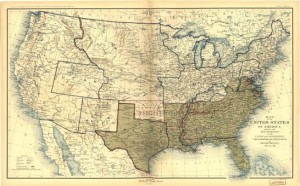 The Union’s Red River campaign heats up as the weather warms up. The objective is to invade Texas by way of Shreveport, Louisiana. To that end the federals under Union General Nathaniel Banks are advancing to Shreveport.
The Union’s Red River campaign heats up as the weather warms up. The objective is to invade Texas by way of Shreveport, Louisiana. To that end the federals under Union General Nathaniel Banks are advancing to Shreveport.
Yesterday, however, Banks made the mistake of trying to take a short cut to Shreveport, in the process moving his army away from the naval gun support which had been protecting his advance. Far from naval protection, Banks, attacked by a rebel force led by Confederate General Richard Taylor, is routed in the Battle of Mansfield. When the federals retreat, the rebels chase them some three miles to Pleasant Hill, where darkness forces the two sides to disengage.
Today, the federals receive reinforcements at Pleasant Hill. Even so, the Confederates attack again this afternoon, coming close to winning in what is the largest battle west of the Mississippi River. But this time the federals ultimately emerge victorious, driving the rebels off the field.
Despite today’s victory, the two days of fighting are a setback for the Union. Banks, unnerved, assumes a defensive posture and, abandoning plans to drive to Shreveport, reverses course and moves eastward toward Union-controlled Alexandria. Texas will have to wait.
Nonetheless, there is growing despair in the South. Last year was a disaster for the Confederacy. While victories in the far western theater early this spring offer a degree of relief, Virginia and Georgia are poised to host the decisive battles of 1864: Grant is determined to defeat the wily Lee and his Army of Northern Virginia, while Sherman is known to have his sights set on Atlanta.
To say that everything must go right for the Confederacy this year is probably no exaggeration. From the Confederate capitol to the Gulf shores, white Southerners are offering up fervent prayers to their God, a situation reflected in an editorial in today’s North Carolina Baptist Biblical Recorder.
The day of fasting and prayer for the nation is past. Let us hope the great truth which it was designed to impress on the public mind, that God is ruler of nations and the giver of victory and peace, will not be forgotten amid the din and excitement of the opening campaign. Upon the distinct and hearty recognition of this truth depend, not only the steadiness and cheerfulness of the people through the fluctuations and changes of the war, but also the condition in which we will come out of it.
At the commencement of this struggle, before we had measured arms with the numerous and splendidly equipped hosts sent against us, there was a general and deep conviction of the necessity of God’s interposition in our behalf and a strong sense of dependence on Him. A prominent member of one of our legislative bodies said in our hearing; “Without God’s assistance we are whipped.” He spoke truly, and spoke the feelings of all. Hence the spirit of solemnity which marked that period of our national history and the regular meetings for prayer held in all parts of the country by the people of God. That was a season to which the christian patriot will delight to look back in coming years.
It is unnecessary to remark that a change has come over the people. The trials and temptations incident to a state of war have drifted them far away from their moorings. Many of them seem to have forgotten that God rules the nations and that our destiny is in His hands. To this fact may be attributed the fluctuations of the public mind, rising into exultation after a victory, and sinking into despondency after defeat. Such a spirit does not belong to him whose heart is stayed on God, he is buoyant and cheerful in the hour of victory, hopeful and undaunted in disasters.
In the same way may we account for the wild and reckless pursuit of gain to which so many of our people have devoted themselves, and the open wickedness pervading all classes of society. Hence, too, the disasters which have tried us so sorely, and from which we are just recovering. Forgetting and dishonoring God, he has visited us in anger to show us the folly and sinfulness of our course, and bring us once more to a proper sense of our dependence on him. He has laid his hand heavily on us, but it has been for our good. Let us so receive it.
In the few weeks of comparative quiet which must lapse before the campaign opens, let us seek to have this truth impressed on our hearts anew, that God rules and that the fate of our country is in his hands. Thus shall we best aid the cause so dear to us all; for God never forsakes those who trust in him and cleave to him. His favor is more important than fleets and armies, since he can enable one to chase a thousand. Thus shall we best secure a peace of mind which neither victory nor defeat can seriously disturb. Thus alone shall we cherish hopes which are not doomed to disappointment. How many predictions in reference to our country have been falsified by the course of events. How many pleasing visions have been swept away by the bloody tide of war. The influence of King Cotton, foreign recognition and foreign intervention have all had their day, flattering us for a season; but they are all gone. So with all hopes from human sources. But he that trusts in God shall not be ashamed, because his hopes shall be fulfilled.
Sources: “Confederates Rout Union at Battle of Mansfield,” History.com (link); Battle of Pleasant Hill, National Park Service (link); “The Source of Hope and Strength,” Biblical Recorder, April 9, 1864 (link)


